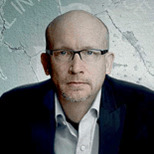Blog

Alex Gibney and the spirit of prior restraint
Why did Alex Gibney feel the need to take to Twitter and attempt to get people not to talk to me? His pointed declaration—in less than 140 characters—suggests that he’s concerned about his peers, especially documentarians, reviewing his films with a critical eye.

At a Q&A event September 28 in Hollywood, sponsored by the International Documentary Association, I decided to go ask Alex why he was compelled to warn people about a possible email or phone call from me about fairness and balance in his films. When my turn came to take the microphone at the Pickford Center’s Linwood Dunn Theater, I set up my question with a cordial greeting to Gibney and event moderator Ben Mankiewicz and introduced myself as “Joe from Freedom Magazine.” What ensued was an unfortunate and also very telling exchange.
My simple query was, “Why are you trying to censor people? Do you think people shouldn’t speak about your work with me?”
Before I could finish my succinctly composed question, Gibney’s kneejerk response tried to derail me. As I struggled to finish my relatively quick inquiries based on the verbatim tweet read aloud, Gibney hurried to interrupt.
Gibney’s tweet and his responses at IDA sought to cast shadows of suspicion on my cultivation of credible sources. His spin-doctoring in this instance is telling of his approach to documentaries just as much as it belies his intent to squelch a freelance journalist’s critical exploration of his work.
Efforts to cloak his failures of fairness behind the idea that what he sells is credible, hard-hitting journalism require a closer look. What one finds is that Gibney’s documentaries are little advanced from the Hollywood “schlock” that characterized, by his own self-deprecating admission, his early days as a B-movie film editor. Since then he has used his familial connections and a pandering press to morph such humble beginnings into an influential career.
Gibney’s overreliance on flashy cinematic effects and sources with glaring credibility problems, as well as transparent agendas, is hardly a hallmark of reliable, let alone pacesetting, documentary filmmaking. The same goes for his penchant for telling one-sided tales based on the assertions of cherry-picked tale-tellers who suit his glaringly preconceived storylines. His two most recent films, on Scientology and the late Steve Jobs, continue to bear the arrogant mark of someone who thinks he is not beholden to ethical standards for truth-telling.
Sensationalism sells in the corporate-controlled media landscape Alex Gibney works for. It’s no shock that mass market purveyors of programming such as HBO, which distributes Gibney’s films, blur the lines between fact and fiction in the interest of attracting a swollen swath of viewers. Judging by the direction Gibney’s work has taken in the last five years, it appears he and HBO pander to the same “clickbait” market of tabloid controversy, fixated on the prurient and anything shocking whether it’s true or not.
Gibney’s filmmaking style deceptively blurs the line between documentary and fiction. That may bode well for the bottom line of his corporate backers eager for buzz and sycophantic praise, but it’s a dangerous shift from important ethical standards. Gibney is indeed a poster boy for the dumbing down of documentary filmmaking. As he portrays fiction as fact to attract an audience more interested in the salacious rather than truth or accuracy, what should be healthy discourse becomes egregious defamation.
In a textbook on documentary production, University of California-Berkeley Graduate School of Journalism professor Jon Else astutely observes that as long as the audience is informed, there is nothing wrong with a little sensationalism. He warns, however, “the danger comes when documentaries purport to be vetted, objective and factual and in fact aren’t.”
That description fits Gibney. He claims his sources are trustworthy, even when he fails to vet them. Gibney may scoff at those who decry the blurring of the line between reality and fiction, as he did at his recent public exhibition when he dismissed the concerns of “documentary purists” and assured his audience that there’s nothing wrong with a little filmic deception. But as Else aptly points out: “There’s no question that there’s a direct connection between the eroding of truth-telling in documentary and the lust for ratings.”
Gibney poisons public discourse and primes it for baseless discrimination and intolerance. And in no uncertain terms, the message via his Scientology film is quite crystal clear: it’s OK to vilify Scientologists for their religious beliefs.
It’s ironic Gibney arrogantly disparages my right to question his motives and instead attempts to besmirch my journalistic standards. As a freelance print reporter for most of my life and a graduate of a prominent journalism school, I have a definitive picture of the importance of portraying events of public interest accurately, fairly and factually.
The experience at Gibney’s Q&A also gave me a glimpse of how it feels to stand for truth and ethical journalism in the face of overt prejudice and intolerance. It is an uncomfortable experience, but one I recommend for any American journalist and documentarian who cares to glimpse what the politics of exclusion is all about.